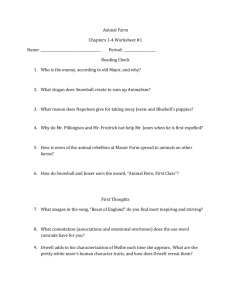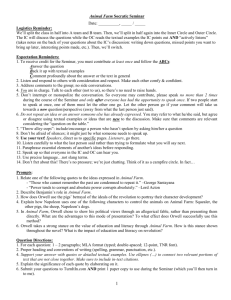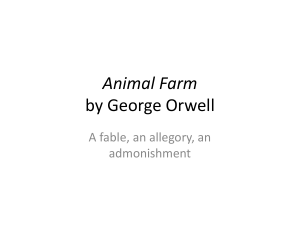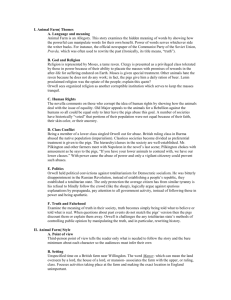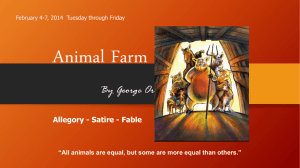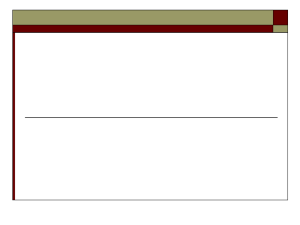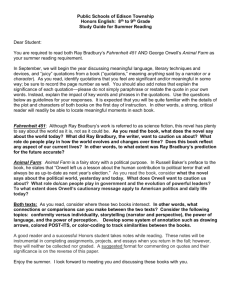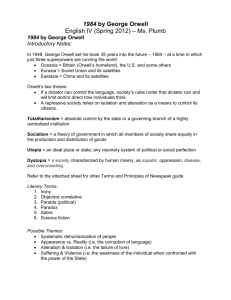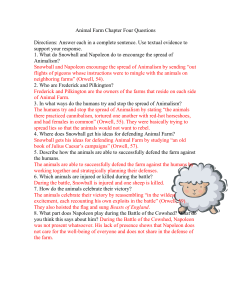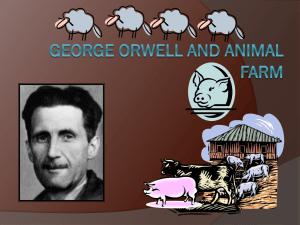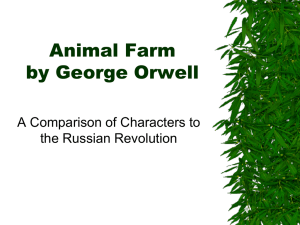George ORWELL wrote excellent allegory novels criticizing
advertisement
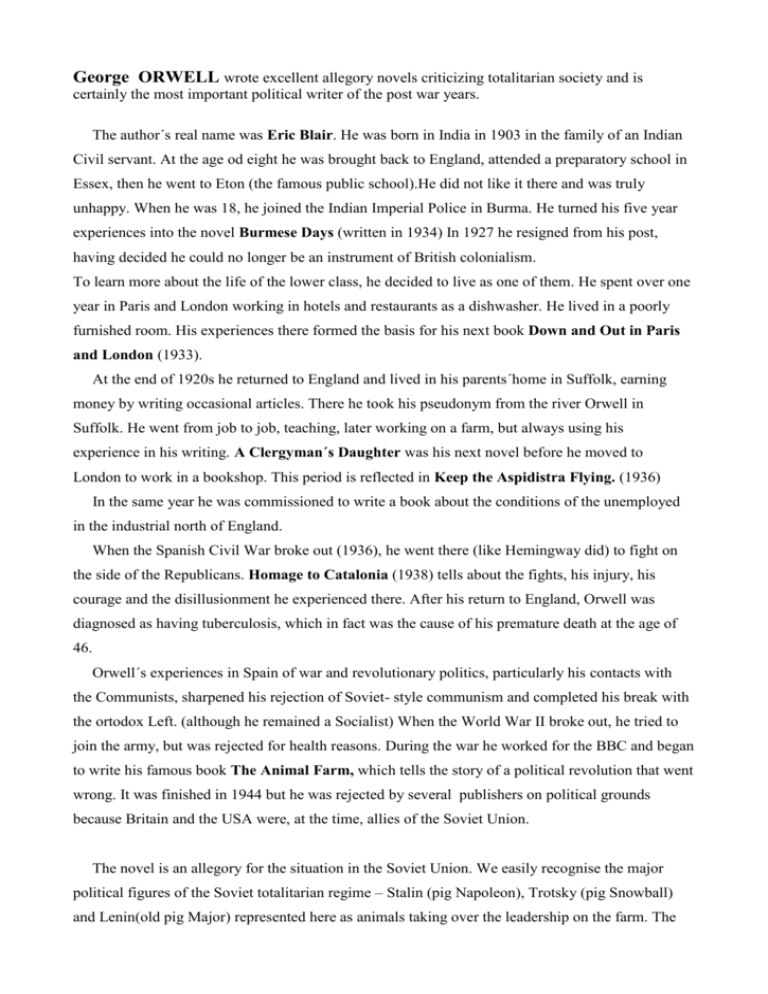
George ORWELL wrote excellent allegory novels criticizing totalitarian society and is certainly the most important political writer of the post war years. The author´s real name was Eric Blair. He was born in India in 1903 in the family of an Indian Civil servant. At the age od eight he was brought back to England, attended a preparatory school in Essex, then he went to Eton (the famous public school).He did not like it there and was truly unhappy. When he was 18, he joined the Indian Imperial Police in Burma. He turned his five year experiences into the novel Burmese Days (written in 1934) In 1927 he resigned from his post, having decided he could no longer be an instrument of British colonialism. To learn more about the life of the lower class, he decided to live as one of them. He spent over one year in Paris and London working in hotels and restaurants as a dishwasher. He lived in a poorly furnished room. His experiences there formed the basis for his next book Down and Out in Paris and London (1933). At the end of 1920s he returned to England and lived in his parents´home in Suffolk, earning money by writing occasional articles. There he took his pseudonym from the river Orwell in Suffolk. He went from job to job, teaching, later working on a farm, but always using his experience in his writing. A Clergyman´s Daughter was his next novel before he moved to London to work in a bookshop. This period is reflected in Keep the Aspidistra Flying. (1936) In the same year he was commissioned to write a book about the conditions of the unemployed in the industrial north of England. When the Spanish Civil War broke out (1936), he went there (like Hemingway did) to fight on the side of the Republicans. Homage to Catalonia (1938) tells about the fights, his injury, his courage and the disillusionment he experienced there. After his return to England, Orwell was diagnosed as having tuberculosis, which in fact was the cause of his premature death at the age of 46. Orwell´s experiences in Spain of war and revolutionary politics, particularly his contacts with the Communists, sharpened his rejection of Soviet- style communism and completed his break with the ortodox Left. (although he remained a Socialist) When the World War II broke out, he tried to join the army, but was rejected for health reasons. During the war he worked for the BBC and began to write his famous book The Animal Farm, which tells the story of a political revolution that went wrong. It was finished in 1944 but he was rejected by several publishers on political grounds because Britain and the USA were, at the time, allies of the Soviet Union. The novel is an allegory for the situation in the Soviet Union. We easily recognise the major political figures of the Soviet totalitarian regime – Stalin (pig Napoleon), Trotsky (pig Snowball) and Lenin(old pig Major) represented here as animals taking over the leadership on the farm. The animals on a farmled by the pigs, drive out their master Jones and take control of the farm, but the purity of their political ideas is soon destroyed, and at the end they are just as greedy and dishonest as the farmer whom they drove out. This satire is written in the form of a fable which bears the message that absolute power corrupts and a new tyranny replaces the old. The pigs make up a complete ideological system which is named Animalism. According to this ideology Seven Commandments are accepted and the animals should live by them: 1. Whatever goes upon two legs, or has no wings, is an enemy 2. Whatever goes upon four legs, or has wings, is a friend 3. No animal shall wear clothes 4. No animal shall sleep in bed 5. No animal shall drink alcohol 6. No animal shall kill other animal 7. All animals are equal After the revolution (driving out the lazy, greedy and drunken farmer) the animals are happy and work hard. Their first harvest is marvellous. But gradually all went wrong. Napoleon (Stalin) trains up a bodyguard of fierce dogs (=the Soviet secret police) and uses them to drive Snowball (Trotsky) off the farm and to kill everyone who is against him. Napoleon starts to deal more and more with Men. As the time passes pigs, who long ago moved into the farmhouse, sleep in beds, walk on their hind legs, wear Mr Jones´clothes. Yet the other animals have never lost their sense of honour and privilege in being members of the only farm in England owned and operated by animals. The last chapter of the book shows a drunken party at which Napoleon and his colleagues entertain some local farmers. The poor animals, looking into the farmhouse room from outside, cannot tell the pigs from the Men. Also the basic commandment is changed: All animals are equal but some animals are more equal than others. Orwell´s second best novel, Nineteen Eighty-Four, was finished in 1949 when he was suffering from renewed tuberculosis. It can be read as a warning against totalitarian tendencies. Winston Smith, the main hero, tries unsuccessfully to oppose the regime and gain some individual freedom. Working for the Ministry of Truth, he sees how truth and everyday news can be falsified. This book describes a future world where every word and action is seen and controlled by the state, which has developed a kind of television that can watch people in their own homes, and is changing the language so that only words left are those for objects and ideas that the government wants the people to know about. For Orwell, the quality of a language suggests the quality of the society that uses it, so that zhe government controls a language in order to control completely the people who use it. This picture of the future, influenced by the hardships and dangers of the WWII and the political events that followed it, is a dark despairing one. Orwell recognizes the important part that the state must play in a fair society, but he also feels that all human beings need to be able to be private sometimes so that they can be themselves. It is the story of Winston Smith, a party worker, who begins to question the logic and the truth of the ruthless and uncompromising ruling Party „Ingsoc“ and its leader Big Brother. Winston starts to také risks. He hides from the government cameras which are designed to spy on the population. He finds a book which has been banned by the government. He meets and falls in love with a girl. They make love, knowing that being in love is an illegal act which can be punished by death. He joins a secret group of revolutionaries, who want ot overthrow the government and restore democracy. This, however, is not a story with a happy ending. Winston is caught by the Thought Police and arrested. He is tortured and brainwashed until finally he cannot think for himself anymore and is only able to believe at everything the government says and does is right. In 1949 (when Orwell wrote the book), the year 1984 was a long way off. Fortunatelly, Orwell´s vision of the future was misguided and hasn´t fulfilled. When the year 1984 arrived, citizens were not oppressed by the all-powerful dictatorship, there was no Thought olice or Room 101. Nowadays cameras are everywhere, media is controlled by a few very rich and internationally powerful men. Who knows, Orwell´s vision might become true in the future ???!
